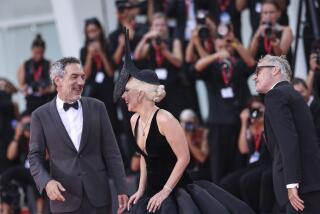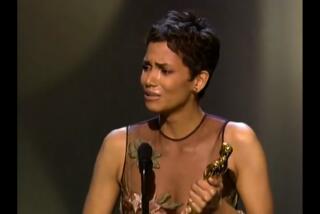When Do You Clap at a Concert? Perhaps the Rules of Applause Need to Be Revised
- Share via
APPLAUSE BY CLAPPING one’s hands is a peculiarly human practice, and if there is any literature on the subject I don’t know where to find it.
I have no doubt that anthropologists have studied this common form of approval, perhaps seeking out its origins. Neanderthal man and his forebears must have clapped their hands in appreciation of some especially neat act of physical skill--a back flip, for example.
I have seen chimpanzees clap their hands in play, but I suspect that they do it in imitation of human beings and do not think of it as applause. Perhaps someone who has lived among apes in the wild will dispute this.
In any case, it is a form of applause so natural to human beings, and so stylized in its performance, that it has not changed in my lifetime. One simply slaps one palm against the other, usually right hand slapping down, at a speed and force commensurate with one’s enthusiasm.
A very slow, modulated applause, with the palms colliding at a rate of about once per second, may actually signal disapproval. Sometimes an entire audience will fall into this rhythm, but it lacks a convincing spontaneity.
Clapping is so automatic a form of recognition that a master of ceremonies appeals in vain to an audience to “please hold your applause until everyone is introduced.” People applaud their favorites, sometimes stomping their feet, cheering and whistling, all of which is primitive and not in the nature of civilized applause at all.
What prompts this essay is the question of when to applaud at a concert. Recently my wife and I went to an all-Mozart concert at the Hollywood Bowl. Now I know that one is not supposed to applaud between movements, but only at the completion of a piece.
I do not know what the origin of this practice is, nor do I especially approve of it. Those who know the rule, and would never think of clapping between movements, are rather supercilious. They scorn those Philistines whose enthusiasm and generosity prompt them to applaud after every movement.
In “Miss Manners’ Guide to Excruciatingly Correct Behavior,” she observes that children must not only be taught not to kick and comment at concerts, but also not to clap between movements.
The other night, after the first moment of Mozart’s Symphony No. 29 in A, there was a large roll of applause. “That’s the Orange County crowd,” a man sitting in an adjoining box said to me.
Though he spoke in jest, it was territorial bigotry and hardly justified by the facts. The Orange County crowd now has its own performing arts center, its colleges, schools and libraries and its enlightened yuppies and is presumably as well schooled in classical music as the Los Angeles crowd.
I am fairly familiar with Mozart’s better-known music, and would hardly make a faux pas with either No. 29 or No. 40, which was played later. Still, a large number of those in the crowd applauded between every movement of both.
At the end of the first movement of the Concerto in B flat for piano and orchestra, I fell in with the crowd and began to applaud, rather half-heartedly. The truth is, I didn’t much care for the concerto and hoped it was over.
I also applauded after the first movement of concerto No. 1 in D for horn and orchestra. The concerto is so charming that I couldn’t help it, and I must say the horn player, William Lane, bowed his head in acknowledgement of the untimely applause.
I don’t know whether the Philistines will prevail, and applause after every movement will become the custom, or whether the longhairs will gradually shame them into conformity. As I say, I’m not against spontaneous applause at the wrong time. It encourages the musicians, it gives people a chance to cough, and it gives everyone a moment of relaxation.
While I’m at it, I might as well express my impatience with those intelligentsia who shout “bravo” for male performers and “brava” for females. (Miss Manners rules that shouting “bravo” is permitted “provided one uses the correct endings and does not shout ‘bravo’ when one means ‘brava’ or ‘ bravi .’ ” I have never shouted “bravo” in my life, but if I were so disposed, I would shout “bravo” whether applauding the tenor, the soprano or the entire company. Bravo is an interjection taken into English from the Italian, and I see no reason why we have to import gender and number with it.
Meanwhile, I will stick to my routine. I never applaud until the entire house is applauding and the conductor has dropped his arms, turned toward the concertmaster and bowed his head. Then, to account for my late start, I begin to applaud, slowly and judiciously, as if I had finally concluded that, yes, the piece was worth applauding.
That plays in Costa Mesa, too.
More to Read
The biggest entertainment stories
Get our big stories about Hollywood, film, television, music, arts, culture and more right in your inbox as soon as they publish.
You may occasionally receive promotional content from the Los Angeles Times.










